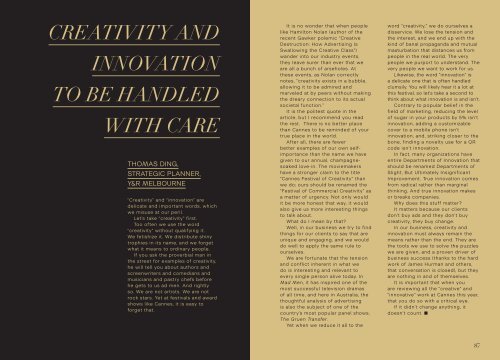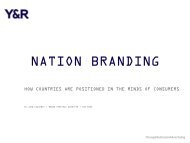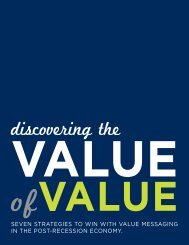View PDF - Young & Rubicam Inc.
View PDF - Young & Rubicam Inc.
View PDF - Young & Rubicam Inc.
Create successful ePaper yourself
Turn your PDF publications into a flip-book with our unique Google optimized e-Paper software.
86<br />
CREATIVITY AND<br />
INNOVATION<br />
TO BE HANDLED<br />
WITH CARE<br />
THOMAS DING,<br />
STRATEGIC PLANNER,<br />
Y&R MELBOURNE<br />
“Creativity” and “innovation” are<br />
delicate and important words, which<br />
we misuse at our peril.<br />
Let’s take “creativity” first.<br />
Too often we use the word<br />
“creativity” without qualifying it.<br />
We fetishize it. We distribute shiny<br />
trophies in its name, and we forget<br />
what it means to ordinary people.<br />
If you ask the proverbial man in<br />
the street for examples of creativity,<br />
he will tell you about authors and<br />
screenwriters and comedians and<br />
musicians and pastry chefs before<br />
he gets to us ad men. And rightly<br />
so. We are not artists. We are not<br />
rock stars. Yet at festivals and award<br />
shows like Cannes, it is easy to<br />
forget that.<br />
It is no wonder that when people<br />
like Hamilton Nolan (author of the<br />
recent Gawker polemic “Creative<br />
Destruction: How Advertising Is<br />
Swallowing the Creative Class”)<br />
wander into our industry events,<br />
they leave surer than ever that we<br />
are all a bunch of arseholes. At<br />
these events, as Nolan correctly<br />
notes, “creativity exists in a bubble,<br />
allowing it to be admired and<br />
marveled at by peers without making<br />
the dreary connection to its actual<br />
societal function.”<br />
It is the politest quote in the<br />
article, but I recommend you read<br />
the rest. There is no better place<br />
than Cannes to be reminded of your<br />
true place in the world.<br />
After all, there are fewer<br />
better examples of our own selfimportance<br />
than the name we have<br />
given to our annual, champagnesoaked<br />
love-in. The moviemakers<br />
have a stronger claim to the title<br />
“Cannes Festival of Creativity” than<br />
we do; ours should be renamed the<br />
“Festival of Commercial Creativity” as<br />
a matter of urgency. Not only would<br />
it be more honest that way, it would<br />
also give us more interesting things<br />
to talk about.<br />
What do I mean by that?<br />
Well, in our business we try to find<br />
things for our clients to say that are<br />
unique and engaging, and we would<br />
do well to apply the same rule to<br />
ourselves.<br />
We are fortunate that the tension<br />
and conflict inherent in what we<br />
do is interesting and relevant to<br />
every single person alive today. In<br />
Mad Men, it has inspired one of the<br />
most successful television dramas<br />
of all time, and here in Australia, the<br />
thoughtful analysis of advertising<br />
is also the subject of one of the<br />
country’s most popular panel shows,<br />
The Gruen Transfer.<br />
Yet when we reduce it all to the<br />
word “creativity,” we do ourselves a<br />
disservice. We lose the tension and<br />
the interest, and we end up with the<br />
kind of banal propaganda and mutual<br />
masturbation that distances us from<br />
people in the real world. The very<br />
people we purport to understand. The<br />
very people we want to work for us.<br />
Likewise, the word “innovation” is<br />
a delicate one that is often handled<br />
clumsily. You will likely hear it a lot at<br />
this festival, so let’s take a second to<br />
think about what innovation is and isn’t.<br />
Contrary to popular belief in the<br />
field of marketing, reducing the level<br />
of sugar in your products by 5% isn’t<br />
innovation, adding a customizable<br />
cover to a mobile phone isn’t<br />
innovation, and, striking closer to the<br />
bone, finding a novelty use for a QR<br />
code isn’t innovation.<br />
In fact, many organizations have<br />
entire Departments of Innovation that<br />
should be renamed Departments of<br />
Slight, But Ultimately Insignificant<br />
Improvement. True innovation comes<br />
from radical rather than marginal<br />
thinking. And true innovation makes<br />
or breaks companies.<br />
Why does this stuff matter?<br />
It matters because our clients<br />
don’t buy ads and they don’t buy<br />
creativity, they buy change.<br />
In our business, creativity and<br />
innovation must always remain the<br />
means rather than the end. They are<br />
the tools we use to solve the puzzles<br />
we are given, and a proven driver of<br />
business success (thanks to the hard<br />
work of James Hurman and others,<br />
that conversation is closed), but they<br />
are nothing in and of themselves.<br />
It is important that when you<br />
are reviewing all the “creative” and<br />
“innovative” work at Cannes this year,<br />
that you do so with a critical eye.<br />
If it didn’t change anything, it<br />
doesn’t count. ■<br />
87




